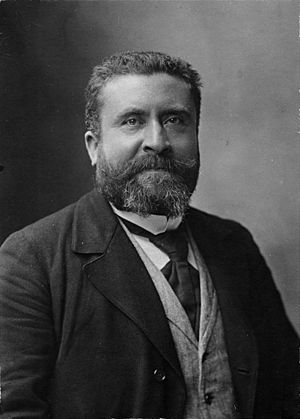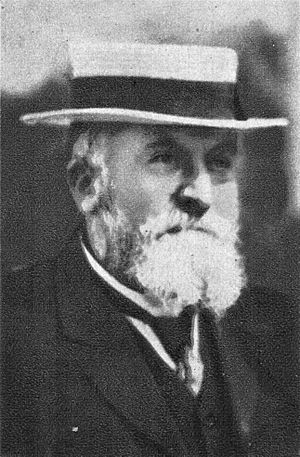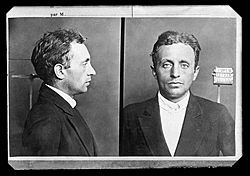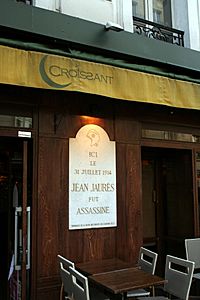Jean Jaurès facts for kids
Quick facts for kids
Jean Jaurès
|
|
|---|---|
 |
|
| Editor of L'Humanité | |
| In office 18 April 1904 – 31 July 1914 |
|
| Preceded by | Newspaper established |
| Succeeded by | Pierre Renaudel |
| Member of the Chamber of Deputies | |
| In office 1 June 1902 – 31 July 1914 |
|
| Constituency | Tarn |
| In office 8 January 1893 – 1 June 1898 |
|
| Constituency | Tarn |
| In office 10 November 1885 – 11 November 1889 |
|
| Constituency | Tarn |
| President of the French Socialist Party | |
| In office 4 March 1902 – 25 April 1905 |
|
| Preceded by | Party established |
| Succeeded by | Party abolished |
| Personal details | |
| Born |
Auguste Marie Joseph Jean Léon Jaurès
3 September 1859 Castres, Tarn, Second French Empire |
| Died | 31 July 1914 (aged 54) Paris, French Third Republic |
| Cause of death | Assassination |
| Resting place | Panthéon |
| Nationality | French |
| Political party | Moderate Republicans Independent Socialists |
| Spouse | Louise Bois |
| Children | Madeleine Jaurès, Louis Paul Jaurès |
| Parent |
|
| Alma mater | École Normale Supérieure |
| Profession | Professor, journalist, historian |
Jean Jaurès (born 3 September 1859 – died 31 July 1914) was an important French Socialist leader. He started as a moderate politician but later became a key figure in the social democratic movement. In 1902, he led the French Socialist Party.
Jaurès was against war and tried to prevent World War I. Sadly, he was assassinated in 1914 just before the war began. He is still remembered as a major historical figure for the French Left. Jaurès believed in balancing different ideas, like individual freedom and working together, and being proud of your country while also working for peace worldwide.
Contents
Early Life and Education
Jean Jaurès was born in Castres, Tarn, France. His family was not rich, but they were well-respected. His younger brother, Louis, later became an admiral and a politician.
Jaurès was a very bright student. He studied at the Lycée Sainte-Barbe in Paris. In 1878, he was accepted into the École normale supérieure, a famous school for philosophy. He became a philosophy teacher in 1881. For two years, he taught in Albi before becoming a lecturer at the University of Toulouse.
In 1885, Jaurès was elected as a Republican representative for Tarn. He worked with moderate politicians at this time.
Jaurès as a Historian
After losing an election in 1889, Jaurès went back to teaching in Toulouse. He became involved in local government and helped start the medical school at the university. He also wrote two important papers for his doctorate in philosophy.
Jaurès became a very important historian of the French Revolution. He studied old documents in Paris and developed a new way of understanding the revolution. His book, Histoire Socialiste (1900–03), looked at how different social classes, especially the middle class and the working class, played a role in the revolution. His ideas influenced how the French Revolution was taught for many years.
Becoming a Socialist Leader
Jean Jaurès started as a moderate politician. But by the late 1880s, he became a strong socialist.
In 1892, miners in Carmaux went on strike because their leader, Jean Baptiste Calvignac, was fired. Jaurès spoke out strongly for the miners. His efforts made the government step in and demand that Calvignac be rehired. The next year, Jaurès was re-elected as a socialist representative for Tarn. He held this seat for most of his life.
Jaurès lost his seat in the 1898 election and was out of parliament for four years. However, his powerful speeches made him a well-known voice for socialism. He worked as an editor for the newspaper La Petite République. He was also a strong supporter of Alfred Dreyfus during the Dreyfus Affair, a famous case where a Jewish army officer was wrongly accused of treason.
Leading the Socialist Party
In 1902, Jaurès was elected again as a representative for Albi. The independent socialists joined with other socialist groups to form the French Socialist Party. Jaurès became its leader. This party believed in social democracy, which meant they wanted to make changes through democratic means, not through revolution.
Jaurès played a big role in uniting different left-wing groups in France. In 1904, he started the socialist newspaper L'Humanité. He helped pass important laws, like the 1905 law that separated the church and the state in France.
In 1905, all the different socialist groups in France came together. They formed a new party called the French Section of the Workers' International (SFIO). Jaurès was a key leader of this new, unified party.
In 1905, Jaurès visited a new wine-making cooperative. He told the farmers that they needed to work together instead of competing against each other.
In the 1906 elections, Jaurès was re-elected for Tarn. He was widely recognized for his skills. He continued to write many books and articles about socialism and politics. He also supported the teaching of regional languages in France, like Occitan and Basque, which was unusual for politicians at the time.
Jaurès was against imperialism, which is when one country tries to control other countries. He believed it was a danger to peace in Europe.
Working for Peace
Jaurès was a strong antimilitarist. He worked hard to prevent the start of World War I. In 1913, he spoke out against a law that would make young men serve in the army for three years. He tried to help France and Germany understand each other better.
As war became more likely, Jaurès tried to organize general strikes in France and Germany. He hoped this would force governments to stop fighting and talk things out. However, many French people wanted revenge for their country's defeat in the Franco-Prussian War and wanted to get back the land of Alsace-Lorraine.
In May 1914, the Socialists, led by Jaurès, won the general election. They planned to take power and work for peace in Europe. Jaurès openly criticized French President Raymond Poincaré and Premier René Viviani, saying they were pushing France closer to war.
In July 1914, Jaurès attended a Socialist meeting in Brussels. He worked well with the German socialist leader, Hugo Haase. On July 20, Jaurès voted against funding a visit by President Poincaré to Russia. He called the visit dangerous and likely to cause trouble. Jaurès rushed back to Paris to try and find a peaceful solution with the government. Russia had started to prepare its army, which Germany saw as a serious threat.
Assassination
On 31 July 1914, Jean Jaurès was assassinated. At 9 pm, he was having dinner at the Café du Croissant in Paris. About 40 minutes later, Raoul Villain, a 29-year-old French nationalist, walked up to the restaurant window. He fired two shots into Jaurès' back. Jaurès died five minutes later.
His death shocked Paris. One of France's most powerful speakers had been killed. Even his political opponent, President Poincaré, sent his condolences to Jaurès' wife. Paris was very tense, almost on the edge of a revolution.
Jaurès' murder brought Europe one step closer to the start of World War I.
On 23 November 1924, his body was moved to the Panthéon in Paris, a special building where famous French people are buried.
See also
 In Spanish: Jean Jaurès para niños
In Spanish: Jean Jaurès para niños




